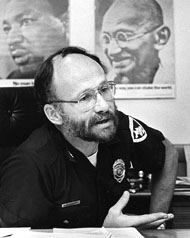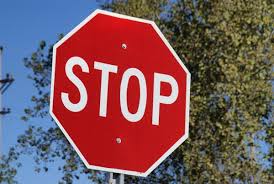Looking back through a half-century of policing, the turmoil of the anti-war and civil rights years, the integration of women, people of color, and those with differing sexual orientations into our ranks, the excitement of putting into practice the new and exciting concepts of problem-oriented policing, getting close to, and working with, the people we served, and being able, from time to time to remain above the occasional and embarrassing times we were sullied by the graft, corruption, false testimonies and excessive force by fellow officers, I must say that the situation we and our nation’s police find ourselves in today is a new low.
Maybe it has been caused by the explosion of smart phones and social media, maybe people are not as respectful to police as they were in the past, but maybe it’s because police are taking the lives of too many people who are unarmed. The impact of this on our nation is enormous.
Is it a trend? We don’t know because police departments in our nation are not required to report these shootings. They are voluntary and some cities simply do not report.
Policing in America is at a tipping point. The number of police killings may be important, but the fact is that one mistake, one young persons life extinguished in circumstances many people think is outright wrong is one too many.
What can police do? The first step is to stop the killing. Yes, I am being harsh especially to those of you who, with great control in your own use of force, selflessly serve. But you know that policing is a field in which the behavior of a few impact your ability to do a good job and be trusted.
Stop killing the unarmed must be your first step — review your policies, review your training, review the tools of force you use, review your attitudes about people — listen to your hearts — you know this must stop.
The task of policing is a learning and teaching adventure about the proper handling of people. It is 90% relational and 10% coercive. I firmly believe that if today’s police officers look at this problem they will come to understand that the first step forward to restore trust and support of those whom they serve is to stop using deadly force on those who are unarmed. And coming to that understanding, and with the help of their communities, they can make the necessary changes and share the improvement steps they are taking with their communities.
If they less, they will have failed to rebuild the trust that is absolutely necessary between police and citizens in a free society — and they must do it now!



quote: ” I must say that the situation we and our nation’s police find ourselves in today is a new low.” I find it in my profession as well; patronage, cronyism, graft and downright corruption… they are also prevalent in educational world. A lot of people are on a “3 year career ladder” moving up and everyone will get an elbow in the face if they get in the weay (women as well as men can be bullies)…. It seems to be the norm or ‘business as usual” but the costs have gone up. What was formerly graft in the state department of education at $150 escalated to $10,000 and has now skyrocketed and people don’t see it is wrong ethically and morally? I know you are doing some wonderful things helping people to be informed and to share your viewpoints and experience. We need a lot more of this dialogue. I personally called the President of OK U. and thanked him for his leadership in the racist attacks; today I see there are articles stating that fraternities on college campus should lose their non-profit status if they use racial hatred as their social presentation for what they are all about. We need more leadership such as you are sharing here.
LikeLike
Yes, it’s all about leadership — and you are doing it! Thank you.
LikeLike
“Policing in America is at a tipping point. The number of police killings may be important, but the fact is that one mistake, one young persons life extinguished in circumstances many people think is outright wrong is one too many.” We have similar issues in corrections (the school to prison pipeline) and we have areas/issues of the foster care Division of Social Services where the social workers are judged harshly for a wrong decision on either side of the cutting; either they didn’t remove a child from home soon enough or they are removing a child based on inadequate information or some other lawsuit. I think of it this way, as a teacher in classrooms I would not want to wear a “body camera” all day in my job because that would mean the essential elements of trust have broken down and , if you don’t trust me, then I cannot do my work as a teacher. I don’t know how to go about rebuilding this trust except on the local levels community by community and neighborhood by neighborhood but a lot of it depends upon leadership in the state offices, the governor’s office… etc. A student once put it this way : “there used to be a president who didn’t lie but he is dead”… that is an over-generalization and presented from an adolescent’s viewpoint but I think it is significant in our attitudes today (Rick Perlstein gave that quote in his book and I have paraphrased it).
LikeLike
Well said, Jean. Trust is an essential ingredient of our daily lives. Without it, life is less.
LikeLike
When you look back at the reasons for the officer shooting you have to wonder why? didn’t he order that man sitting on the front steps of his poach to lay the gun down and hands up?? When he was hit in the face Why didn’t he strike back in like fashion and control the situation without the use of deadly force?? Was that a just cause for killing him? I start to wonder if today’s police use a shoot first, then come up with a reason. Or is this an extention of “Stand your ground” mentality?
But the two officers shot in MO was a show of complete disrespect of police.
LikeLike
Good questions, John. I think we are all suffering from a collective fog — guns, war, “stand your ground,” militarization, political polarization, overlooking what;s happening, etc. It was H. Rap Brown who said “violence is as American as cherry pie.” He also stated during those turbulent years of the Black Panther Party and SNCC: “If America don’t come around, we’re gonna burn it down.” I don’t like the message and I positively abhor the idea that killing police is the way out for all of us. But as Dr King warned us almost 50 years ago that we must “learn to live together as brothers or perish together as fools!” Thanks for commenting.
LikeLike
Empty hand control. Somehow, when “tools” entered the picture, reason was permitted to leave. Use of force is by nature ugly and hiding it behind gases and electronics doesn’t (and shouldn’t make justification any less necessary) make it any more acceptable. When I first started we were referred to as “Peace Officers” by state statute. Not any more and I think that’s a shame…
LikeLike
Several very fine blogs with one thing missing: impunity. The view of someone who has had a police club swung at him (or her) sees things differently even from you, peace marcher and police reformer. What I learned in 1967, what we all learned since, is that for me to touch the lapel of an officer, especially but not only one with badge hidden, is to invite a beating that will never, can never, result in an arrest of the attacker. And it may not even take a touch. I cannot see how this will change and if it does not, collective apologies will remain inadequate. your friend
paul buhle
On Sat, Mar 14, 2015 at 8:11 AM, Improving Police wrote:
> improvingpolice posted: ” Looking back through a half-century of > policing, the turmoil of the anti-war and civil rights years, the > integration of women, people of color, and those with differing sexual > orientations into our ranks, the excitement of putting into practice the > ne”
LikeLike
Reblogged this on e-Roll Call Magazine.
LikeLike